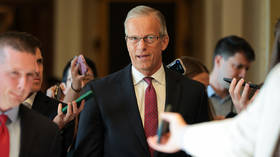Beijing has slammed Washington’s “long-arm jurisdiction,” calling the proposed 500% tariffs “illegal”
China has blasted US plans to hit Russia’s trade partners with steep secondary tariffs, calling the proposed 500% duties “illegal unilateral sanctions” that undermine efforts to resolve the Ukraine conflict.
The rebuke follows legislation floated by hawkish senator Lindsey Graham, which if adopted would grant US President Donald Trump the authority to impose tariffs of up to 500% on countries that maintain trade with Russia. Graham singled out China, India, and Brazil, emphasizing that Trump would have “maximum flexibility” in applying the sanctions.
Responding to a question about the tariff threat, Chinese Foreign Ministry spokesperson Lin Jian told reporters on Tuesday that Beijing “firmly opposes any illegal unilateral sanctions and long-arm jurisdiction.” He added, “There are no winners in a tariff war,” and reiterated that “dialogue and negotiation are the only viable way” to end the conflict.
Graham claimed the measure would give Trump a “sledgehammer” against Russia. Moscow has denounced the sanctions as illegal and accused Western nations of exploiting the Ukraine conflict to stifle its development.
The bill, however, has been put on hold as Senate Republican leader John Thune said on Monday that Trump could act unilaterally. The lawmaker was cited by Politico as saying it “sounds like… the president is going to attempt to do some of this on his own,” but if Trump later decides it would “add value and leverage” to his negotiations, “we’ll be ready to go.”
Trump said on Monday that he was “very unhappy” with Russia and threatened tariffs of up to 100% on countries that continue trading with Moscow unless a deal to end the Ukraine conflict is reached within 50 days. He made the remarks during a meeting with NATO Secretary-General Mark Rutte in the Oval Office.
China has become Russia’s top trading partner, with bilateral trade hitting a record $245 billion in 2024. Beijing has consistently opposed “unilateral” sanctions on Moscow and offered to mediate a ceasefire in Ukraine. In May, Chinese President Xi Jinping and Russian President Vladimir Putin met in Moscow, vowing to deepen the two countries’ “strategic partnership” and boost trade ties.

 9 hours ago
2
9 hours ago
2











 English (US) ·
English (US) ·